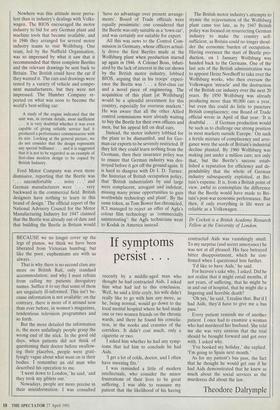If symptoms
persist . .
BECAUSE we no longer cover up the legs of pianos, we think we have been liberated from Victorian humbug; but like the poor, euphemisms are with us always.
That is why there is no second class any more on British Rail, only standard accommodation; and why I must refrain from calling my patients derogatory names. Suffice it to say that some of them are singularly ill-informed. This isn't be- cause information is not available: on the contrary, there is more of it around now than ever before, in women's magazines, tendentious television programmes and so forth.
But the more detailed the information is, the more unfailingly people grasp the wrong end of the stick. In the good old days, when patients did not think of questioning their doctor before swallow- ing their placebos, people were grati- fyingly vague about what went on in their bodies. I remember an old man who described his operation to me.
'I went down to London,' he said, 'and they took my giblets out.'
Nowadays, people are more precise in their misinformation. I was consulted recently by a middle-aged man who thought he had contracted Aids. I asked him what had led to this conclusion. Well, he said a little coyly, his wife didn't really like to go with him any more, so he, being normal, would go down to the local mental hospital where he had made one or two women friends on the chronic wards, and there he found his consola- tion, in the nooks and crannies of the corridors. It didn't cost much, only a cigarette or two.
I asked him whether he had any symp- toms that led him to conclude he had Aids.
`I get a lot of colds, doctor, and I often have sneezing fits.'
I was reminded a little of modern intellectuals, who consider the minor frustrations of their lives to be great suffering. I was able to reassure my patient that the likelihood of his having contracted Aids was vanishingly small. To my surprise (and secret annoyance) he was not at all pleased. His face betrayed bitter disappointment, which he con- firmed when I questioned him further.
`I'd like to have Aids,' he said.
For heaven's sake why, I asked. Did he not realise that it might entail months, if not years, of suffering, that he might be in and out of hospital, that he might die a lingering and horrible death?
'Oh yes,' he said, 'I realise that. But if I had Aids, they'd have to give me a bus pass.'
Every patient reminds me of another patient. I once had to examine a woman who had murdered her husband. She told me she was very anxious that the trial should be brought forward and got over with. I asked why.
`I've booked my holiday,' she replied. `I'm going to Spain next month.'
As for my patient's bus pass, the fact that he thought he would get one if he had Aids demonstrated that he knew as much about the social services as the murderess did about the law.
Theodore Dalrymple


















































 Previous page
Previous page